Product Disclaimers
Whether you sell children's toys, bath products, barbecues, or something else entirely, you need to know how product disclaimers work. If not, you could end up exposing yourself and your business to a whole lot of unnecessary legal liability.
A product disclaimer is a written statement that's designed to limit (or even completely eliminate) the legal liability that comes with selling products. For example, the maker of a product might include a disclaimer that says it's not responsible for what happens if you use the product differently than the way it was intended to be used. Or a product disclaimer may say that there's a limited warranty that only applies to certain portions of the product, and only for a limited window of time.
Let's take a look at some of the most commonly used types of product disclaimers and why they're important.
Limit of Liability Product Disclaimer
In the US, consumer law guarantees that products are safe as long as they are used in a reasonable and foreseeable way. The term "reasonable and foreseeable" is important here. With any product, there are specific ways that the average person will use it, and when you consider those uses, there are certain risks and consequences that may arise from them.
However, many manufacturers try to shield themselves from any kind of legal responsibility that might arise by including a general liability disclaimer that says something like:
"No claims, representations or warranties, whether express or implied, are made by both our companies as to the safety, reliability, durability and performance of any of our companies' products. Furthermore, our company accepts no liability whatsoever for the safety, reliability, durability and performance of any of our companies' products."
However, if you think that typing out one of these general disclaimers will protect you from any and all legal action, think again. Legal experts say that these types of product disclaimers aren't always valid in court because if they applied in every single situation, manufacturers would have no real incentive to make sure that their products are safe.
As Is or No Warranty Product Disclaimer
You may hear them referred to in two different ways, but an as is product disclaimer has the same effect as a no warranty product disclaimer.
Instead of a general disclaimer, some manufacturers will include an as is or a no warranty disclaimer. Specifically, they'll say that the customer is buying the product in the exact condition it was in at the store.
Because potential customers have a chance to inspect the product before they buy it, these product disclaimers typically eliminate all of the manufacturer's liability. After all, the consumer looked at the product, evaluated it, and bought it. If anything happens as a result of the product's condition, the manufacturer isn't legally responsible.
Here's an example of an as is product disclaimer for a used car:
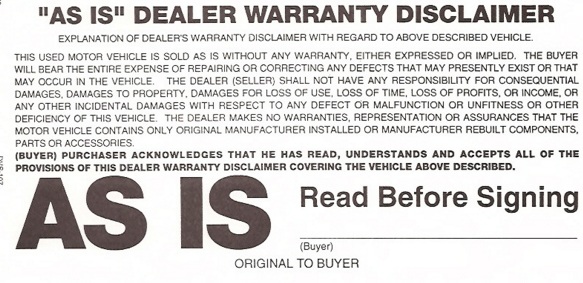
You're not going to be able to drive this car off the lot without signing your name next to the giant "AS IS." That way, the used car salesman is protected if you try to take him to court because the car doesn't work properly. It says right in the disclaimer that "THE BUYER WILL BEAR THE ENTIRE EXPENSE OF REPAIRING OR CORRECTING ANY DEFECTS THAT MAY PRESENTLY EXIST OR THAT MAY OCCUR IN THE VEHICLE."
In other words, if the car breaks down, it's your problem.
Limited Warranty Product Disclaimer
Like the name implies, a limited warranty product disclaimer works a little bit differently than a no warranty disclaimer does.
Here's an example of a limited warranty product disclaimer from Green Mountain Grills:
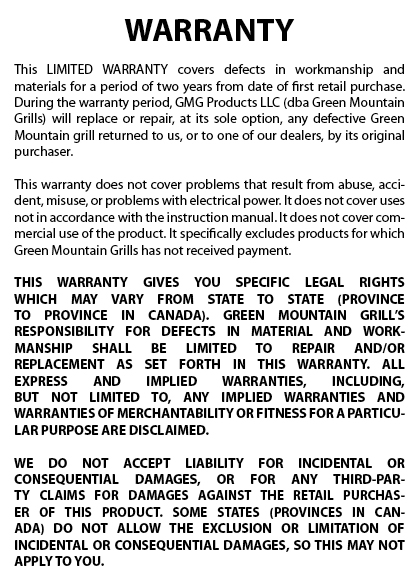
If you buy one of these grills and something goes wrong in the first two years, Green Mountain Grills will replace or repair your grill. However, if you look carefully, you'll see that this warranty only applies to "defects in workmanship and materials." If your grill malfunctions because of something that ISN'T a defect in workmanship or materials, Green Mountain Grills disclaims all responsibility for it.
For example, if you accidentally slam the grill's lid too hard and it dents, Green Mountain Grills isn't going to pay for the repair.
Exclusive Obligation Product Disclaimer
These disclaimers are used to protect sellers from consumers who use products in a way that wasn't intended by the manufacturer and/or retailer. For example, if you buy a product and then use it in some kind of way that isn't legal, the seller isn't legally responsible for what happens.
Here's how IRPC puts this type of product disclaimer to use:

Some examples of this type of product disclaimer can seem so obvious that they don't even need to be written. Check out this example from Midrash Manicures, a company that makes special decals for your fingernails and toenails:
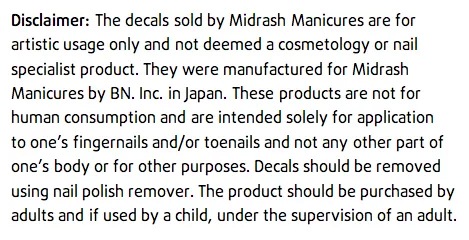
The average person probably knows that they shouldn't eat nail decals, but Midrash Manicures created this product disclaimer so that if anyone does eat one, they can't claim that Midrash Manicures had a duty to tell them not to. They make it very clear that consuming these decals is a misuse of the product.
Why bother to mention this at all?
It's much easier to write a couple of sentences in a disclaimer than it is to argue your case in court.
No Guarantee Product Disclaimer
Take a look at the first sentence of this product disclaimer from Microsemi:

Microsemi makes it clear that it doesn't guarantee the "suitability" of its products for any purpose and doesn't assume any liability for whatever happens when using one of its products.
No guarantee product disclaimers aren't always this broad, though. Check out the product disclaimer that Sure Seal uses:
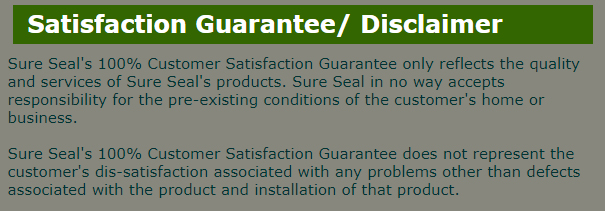
Yes, Sure Seal has a Customer Satisfaction Guarantee, but this product disclaimer explains exactly what that means.
First off, it only guarantees that its products will be of good quality. For example, if you buy one of the Energy Star windows and it doesn't sit in your window frame just right because the frame has eroded over time, that's not Sure Seal's fault. If there wasn't a "pre-existing condition" in your window frame, you'd be happy with how the window looked.
Next, it points out that the Customer Satisfaction Guarantee only covers "defects associated with the product and installation of that product." So if you buy one of the canopies and you don't like the color of the canopy next to the color of the paint on your house, Sure Seal has no legal obligation to give you a new canopy. But if the canopy itself came with a crooked leg, that would be considered a product defect, and the Customer Satisfaction Guarantee would apply.
Trademark Infringement Product Disclaimer
Manufacturers often include a specific disclaimer with their products that says they're not affiliated with any other manufacturer. This disclaimer is used to eliminate confusion between two different brands. You're most likely to see this kind of disclaimer in an advertisement where one manufacturer compares its product to a competitor's.
That's exactly what Aroma Ridge has done in the product disclaimer for its Jamaica Blue Mountain Coffee:
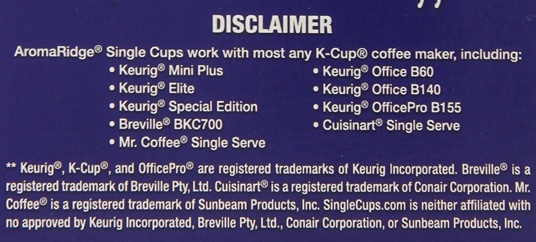
Aroma Ridge has created single-serve coffee packages that are similar to K-Cups. Most coffee drinkers know what a K-Cup is, so this comparison is the easiest way for Aroma Ridge to show the benefits of their coffee's package design.
However, it has a very clear disclaimer that Keurig, K-Cup, and OfficePro are all registered trademarks that belong to Keurig Incorporated. That way, potential customers won't assume that Aroma Ridge's coffee is made by or associated with Keurig.
Some trademark infringement product disclaimers are much more broad than this one. For example, take a look at the third party trademark disclaimer that TIBCO Software has used:
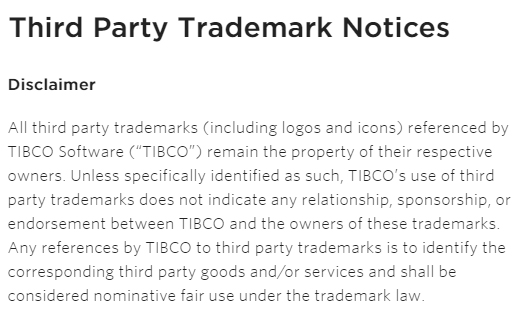
TIBCO makes it clear that any reference to another company's trademark is "considered nominative fair use." In other words, the US laws on trademark infringement allow an exception for what's called nominative fair use. If you're only mentioning the third party trademark by name or in a short comparison to your own similar product, that would be allowed under the law because it's considered nominative fair use.
You should still include a product disclaimer, though, just to make sure that everyone understands that your product isn't related to the other one.
Or, you may see a trademark infringement disclaimer when a product has been repackaged by a third party. This is very common on products that a retailer bought in bulk from the manufacturer, then repackaged into smaller, more consumer-friendly batches.
In this case, the product disclaimer would need to mention that the repackaging company is separate from the manufacturer. That way, consumers won't be confused as to who's responsible for the product they've bought.
For example, Mag-Al is a sugar-free antacid that is manufactured by Pharmaceutical Associates, Inc. You'll see their name on the disclaimer, but it's followed by another company name - Cardinal Health - as the repackager:
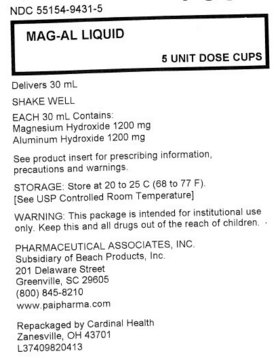
This product disclaimer was actually written by Cardinal Health because that's the company that repackaged the medicine. As a result, if there's any kind of liability issue with this particular bottle of Mag-Al, Pharmaceutical Associates, Inc., will likely tell you that your problem is with Cardinal Health, not them.
Buyer-Related Product Disclaimer
Some products simply aren't meant to be used by children, while others may not be legal for certain people to use. That's why some manufacturers will go into detail about exactly who their products are designed for.
Check out this disclaimer from Survival Life, a company that sells knives:

The very first thing Survival Life says in its product disclaimer is that it will only sell its knives to "individuals who can legally purchase" them. In many states, convicted felons can only carry knives that are less than four inches long. Plus, some states prohibit minors from carrying knives that are of a certain length.
Because the laws vary from state to state, Survival Life makes sure that it disclaims responsibility if someone buys one of their knives when they're not legally allowed to. By saying "you represent that you are of legal age to purchase this merchandise and that this merchandise can be purchased and owned in your state, county, and/or city of residence," Survival Life is essentially telling its customers to confirm that they're in good legal standing to make purchases.
If one of Survival Life's knives wound up in the wrong hands, it would likely point to this product disclaimer and argue that the customer's representation was false and, therefore, the company isn't legally liable for anything that customer does with one of their knives.
How Do You Write a Great Product Disclaimer?
Because there are so many different types of product disclaimers, it's important to evaluate your specific situation when you sit down to write yours.
First, figure out what you need to disclaim. Here are some questions to ask yourself:
- Is your product dangerous in some way (like Survival Life's knives) and you need to make sure it doesn't end up in the wrong hands?
- Are you mentioning a competing product and need to make sure that no one confuses its trademark for yours?
- Do you have a money-back guarantee that only applies in certain situations?
- Do you only make repairs to the product in certain situations?
No matter what you're selling and disclaiming, you need to make sure that your message is crystal clear. If the average consumer doesn't understand your product disclaimer, it may not hold up in court.
Here are some ideas for making your product disclaimer easy to understand:
- Search the web for competing product disclaimers to see how they're worded.
- Look for product disclaimer templates. They'll only offer the bare bones, but you'll be able to see how to structure your disclaimer so that it's clear.
- Keep your disclaimer short, simple, and to the point. The last thing you need in there is long strings of legal jargon that the average consumer doesn't understand.
- Figure out all of the places where your product disclaimer needs to appear such as on the product packaging itself, on your website, in your individual product descriptions, in your TV ads, in your emails, etc.
A good product disclaimer can mean the difference between informed customers who keep coming back and long legal battles. It may only take a sentence or two, but the right product disclaimer offers endless protection.